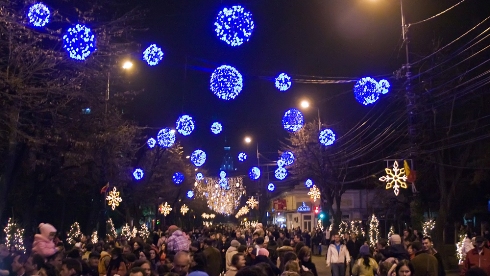Romanians wished "Happy 2010" in a traditional way
Romanians welcomed 2010 with joy and fireworks. Like every year, they followed old traditions in order to have luck, prosperity and happiness.
> Benchea Iulia-Simona (Universitatea Alexandru Ioan Cuza)Like divinity, for Romanians, time is born every year. First is young, then it grows up. It gets old, and in the end dies, so it can get back to life, again, after 365 days. On 31st of December, Romanians bury the old year, and wait for the new year to come. “Ingropatul Anului” (“Bury of the Year”) was the name of this period in the past and “Revelion” is how the waiting for the new year is now called. Dragging its name in French, "Réveillon" means “watch”.
Romanians wait for the New Year, with the customs and traditions that have been around for centuries. On the night of 31st of December, Romanians go from house to house with “Plugusorul” (The “Little Plough”), a traditional procession with a decorated plough. It is a well wishing custom for the field fruitfulness into the new year. The ploughmen are teenagers and children carrying whips, bells and pipes in their hands.
Romanians also play “Ursul” (The “Bear”), a game in which a young person dresses up in a bear costume adorned with red tassels on its ears, on his head and shoulders. The person wearing the bear costume is accompanied by fiddlers and followed by a whole procession of characters, among them a child dressed-up as the bear's cub. Inspired by the crowd’s singing: "Dance well, you old bear/ And I’ll give you bread and olives", the bear grumbles and imitates the steps of the bear, striking strongly against the earth with the soles of its feet to the sound of drums and pipes.
Another game played on 31 of December is “Capra” (The “Goat”). Throughout the season, teenagers and young adults especially, enjoy caroling with the “Goat”. The “Goat” is actually a usually boisterous young person dressed up in a goat costume. The whole group dances through the streets and from door to door, often with flute music. This tradition comes from the ancient Roman people and it reminds us of the celebration of the ancient Greek gods.
On 1st of January, Romanians, especially children, play “Sorcova”, which is a special bouquet used for New Year's wishes early New Year’s morning. Children wish people a “Happy New Year!” while touching them lightly with this bouquet. After they have wished a Happy New Year to the members of their family, the children go to the neighbors and relatives saying the following: Merry Sorcova,/ May your health be strong / And your life long: / As an apple tree / As a pear stately / As a rose bush fair / Blossoming beyond compare: / Strong as a granite rock / Quick as an arrow’s shock / Hard as an iron bar / Tougher than steel by far, / Over summer, over spring,/ May your health be great / A New Year with happiness/ And in everything success.
Nowadays people often use an apple-tree or pear-tree twig decorated with flowers made up of colored paper. The children receive all kinds of treats such as: cakes, honeycombs, biscuits, pretzels, candies, nuts, money.
<voltar>

Multimédia